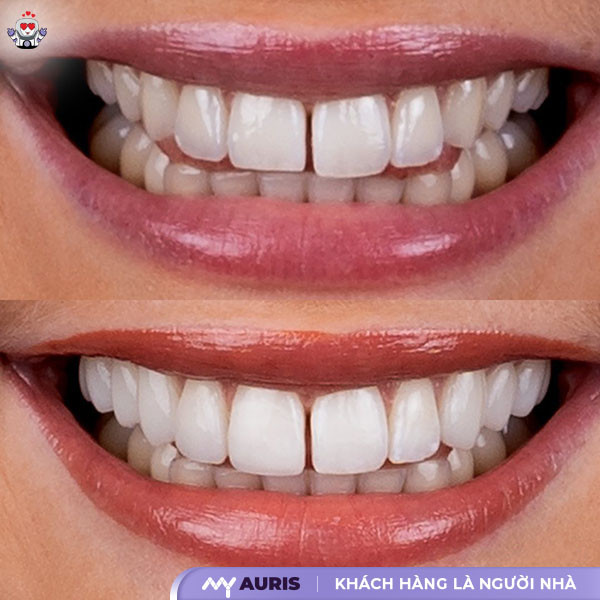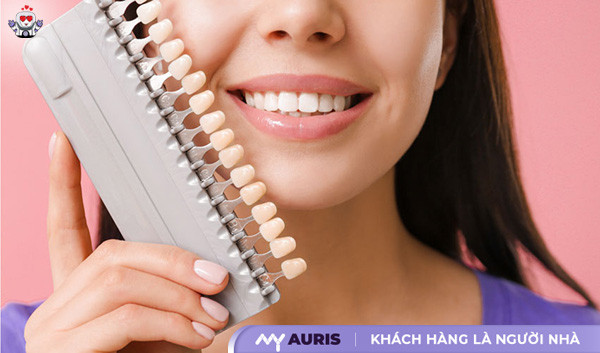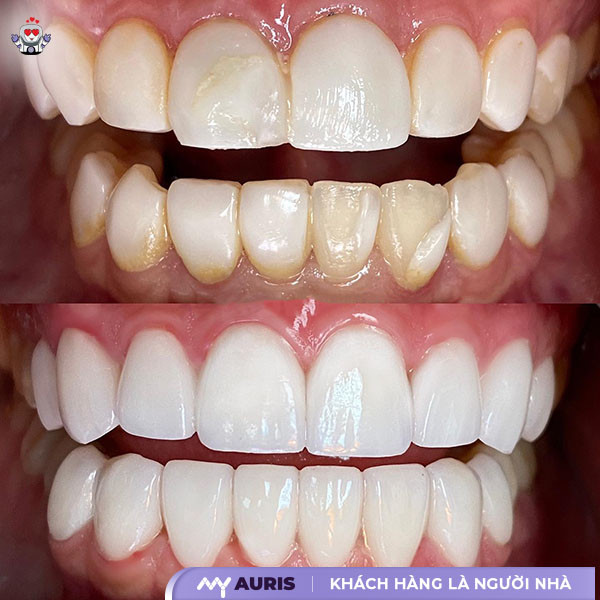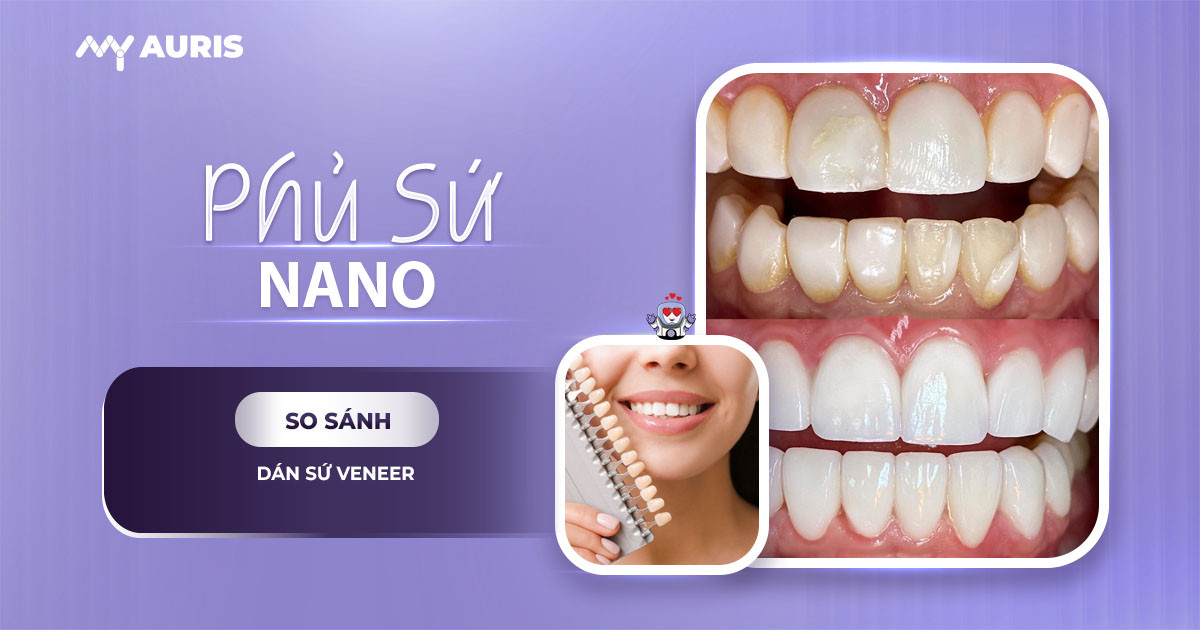Nano porcelain coating is currently a popular cosmetic dentistry method due to its ability to quickly whiten teeth, providing a bright white smile without excessive costs. However, despite its attractive advantages and reasonable price, is this method truly safe for oral health?
In essence, nano porcelain coating is a thin layer using nano porcelain material to improve tooth color and surface, making teeth evenly colored and shiny after just a few applications. Due to its clear effectiveness and accessible cost, it is considered a popular method in cosmetic dentistry today.
What is Nano Porcelain Coating?
Nano porcelain coating is a method that uses Composite material or “nano porcelain” to cover the tooth surface, aiming to conceal dental imperfections such as discolored, uneven, chipped, or slightly gapped teeth. The material has a color and luster quite similar to natural teeth, helping to improve aesthetics to some extent.
However, in reality, nano porcelain coating is not a new technology but merely a form of aesthetic dental bonding, a technique that has existed for a long time in dentistry. Many entities advertise it as a breakthrough method, but it is essentially the process of coating teeth with Composite material, commonly used for filling cavities, chipped teeth, or slightly gapped teeth.

Nano porcelain coating can also be confused with porcelain veneers, a more modern aesthetic technique that uses ultra-thin porcelain shells (about 0.3 – 0.5mm thick) crafted with nano technology to bond onto the tooth surface. Veneers not only offer high durability but also preserve the maximum amount of natural tooth structure.
Facts to know about nano porcelain coating:
- It is not a new advanced technology as advertised.
- Composite material has low durability, is prone to staining, and chips off after a short period, severely affecting aesthetics.
- Completely covering the tooth surface can be harmful to oral health if not performed with proper technique.
- This is not an ideal choice if you are looking for long-term improvement.
Before choosing nano porcelain coating, thoroughly research other dental methods such as porcelain veneers or full porcelain crowns, ensuring they suit your dental condition, aesthetic goals, and desired durability.

Clear Distinction Between Nano Coating and Porcelain Veneers
Many people are easily misled by vague advertisements, believing that Nano coating and porcelain veneers are similar techniques in cosmetic dentistry. However, this perception is entirely incorrect. In reality, nano dental porcelain coating and ultra-thin porcelain veneers are two distinctly different methods in terms of technique, effectiveness, and durability. Below is a detailed comparison table to help you understand better:
| Criteria | Nano Coating | Porcelain Veneers |
Technique |
– Is a traditional dental bonding technique, often used for filling cavities, slightly gapped teeth, minor chips…
– The main material is Composite – a common material in dental filling and bonding procedures. |
– Requires grinding a very thin layer of tooth enamel, then bonding an ultra-thin porcelain veneer onto the surface.
– Is a modern, highly safe cosmetic dental solution. – Effectively fixes chipped teeth, broken teeth, discolored teeth, mild overbites or underbites… |
Effectiveness |
– Low dental aesthetic quality, prone to yellowing over time.
– Composite material easily discolors, quickly losing its aesthetic appeal. – Can easily lead to oral health problems if not properly cared for. |
– Significantly improves the aesthetic appearance of teeth in terms of shape, size, and color.
– Maintains a natural look like real teeth. – Ensures oral health, causes no irritation. |
Durability |
– Lifespan of only 1 – 2 years, prone to chipping or peeling.
– Suitable for temporary restorations. |
– High dental durability, lasting 15 – 20 years with proper care.
– A long-lasting and reliable solution for those seeking comprehensive dental improvement. |
How Much Does Nano Porcelain Coating Cost?
This is a common question for many individuals interested in this modern dental aesthetic solution. In reality, nano porcelain bonding is still quite limited compared to other popular porcelain coating methods, so not many dental clinics currently offer this service. Therefore, the cost of nano porcelain coating varies among facilities, ranging from 3,000,000 VND/tooth to 5,000,000 VND/tooth, depending on the quality of the porcelain blank, the dentist’s skill, and the dental equipment.
However, consumers need to be very wary of advertisements for nano teeth whitening that cost only a few million VND per arch, or deep discounts of up to 50%–80%. Such excessively low prices often indicate a lack of guaranteed service quality, easily leading to medical complications such as gum infections, discoloration of porcelain teeth, or damage to natural teeth. Furthermore, less reputable dental clinics often do not provide a warranty for porcelain teeth, leaving customers unprotected if issues arise after treatment.

Is Nano Teeth Whitening Good?
Nano porcelain bonding (also known as nano porcelain coating) is a modern aesthetic solution that helps improve yellowed teeth, discoloration, eroded enamel, etc., with many outstanding advantages:
- High durability, can last up to 15 years depending on the type of porcelain teeth, quality of the porcelain blank, as well as the dentist’s skill and the procedure performed at the dental clinic.
- The color and size of porcelain teeth can be flexibly customized according to the customer’s aesthetic needs, helping to create a beautiful, natural smile.
- Clear and transparent warranty policy for porcelain teeth, depending on the specific porcelain line and the dental center performing the procedure.
However, nano teeth whitening also has some disadvantages to consider:
- Not suitable for cases of severely discolored teeth, gapped teeth, underbites, or severe crookedness – these conditions require intervention through orthodontic treatment or full porcelain crowns.
- The hardness of nano porcelain teeth is moderate, so improper care can lead to the porcelain teeth falling off, chipping, or even causing medical complications such as gum infections or damage to the underlying natural teeth.
- Additionally, if low-quality porcelain blanks are used or the procedure is not properly ensured, the porcelain teeth may discolor over time.
So, is nano porcelain coating good for teeth? The answer depends on the customer’s needs, the extent of dental imperfections, and individual financial conditions. If you are looking for a durable yet highly aesthetic option, carefully consider the cost of nano porcelain bonding as well as the quality of nano teeth whitening services at reputable dental centers with modern equipment and a highly skilled team of dentists.
The information above is hoped to help you be more cautious when choosing nano porcelain coating. To achieve optimal and safe results, thoroughly research before making a decision. This is an important step to fix dental imperfections without causing risks.





